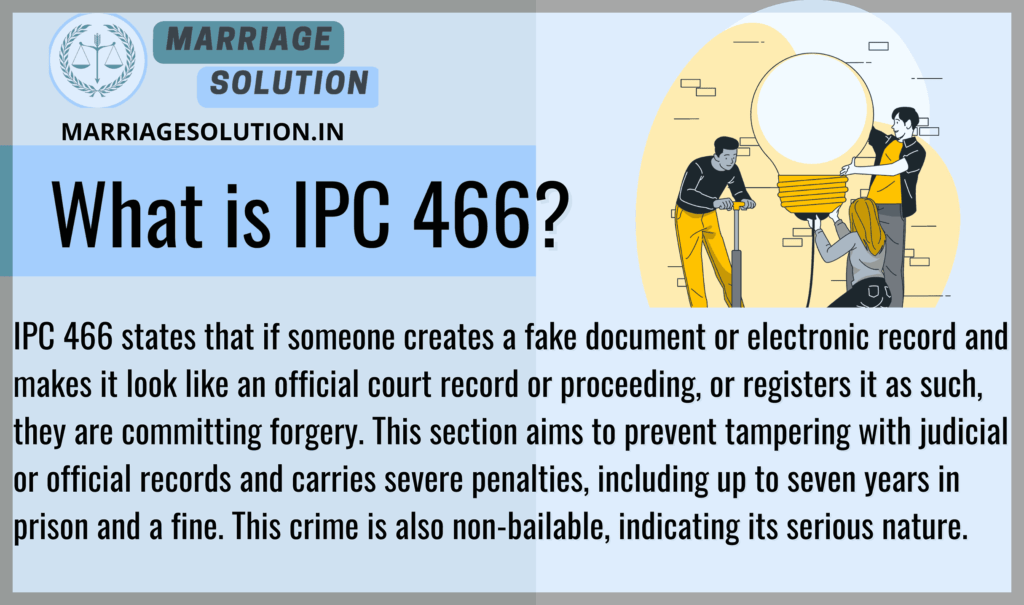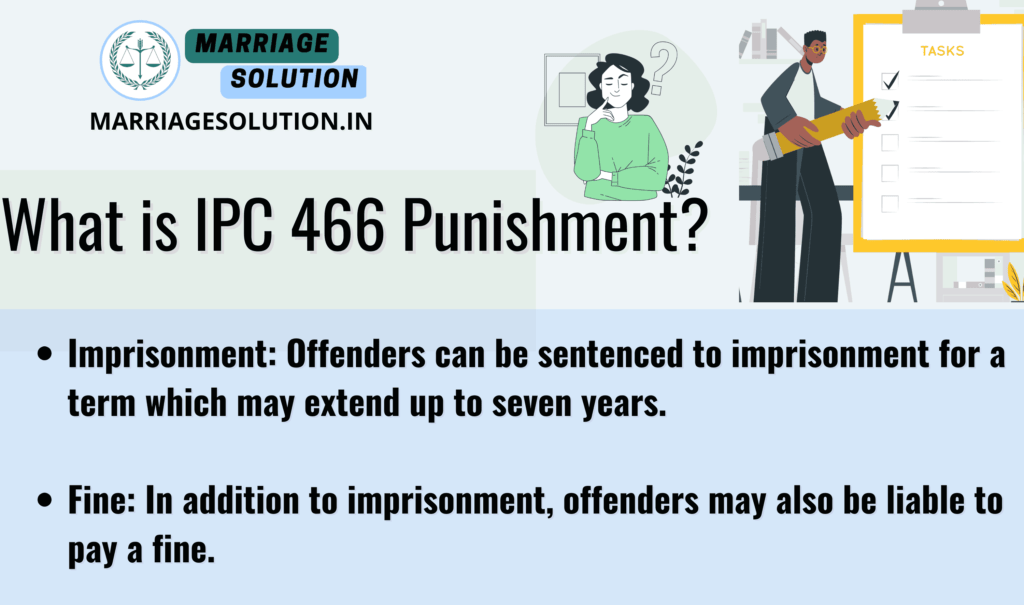- Introduction of 466 IPC
- What is IPC Section 466 ?
- Simplified Explanation of 466 IPC
- IPC Section 466 Overview
- IPC 466 Punishment
- 466 IPC bailable or non bailable ?
- Section 466 IPC in short information
- 466 IPC FAQs
- If you need support with court proceedings or any other legal matters, don’t hesitate to reach out for assistance.
Introduction of 466 IPC
The Indian Penal Code (IPC) Section 466 deals with the crime of forging documents or electronic records to make them appear as official court records or proceedings. This section is crucial for maintaining the integrity of judicial and public records, as tampering with such documents can lead to significant legal and administrative issues. The law imposes severe penalties, including imprisonment and fines, to deter individuals from engaging in such fraudulent activities.
What is IPC Section 466 ?
IPC 466 states that if someone creates a fake document or electronic record and makes it look like an official court record or proceeding, or registers it as such, they are committing forgery. This section aims to prevent tampering with judicial or official records and carries severe penalties, including up to seven years in prison and a fine. This crime is also non-bailable, indicating its serious nature.

Simplified Explanation of 466 IPC
IPC 466 states that if someone creates a fake document or electronic record and makes it look like an official court record or proceeding, or registers it as such, they are committing forgery. This section aims to prevent tampering with judicial or official records and carries severe penalties, including up to seven years in prison and a fine. This crime is also non-bailable, indicating its serious nature.
IPC Section 466 Overview
IPC Section 466 says that if someone makes a fake document or electronic record and pretends it’s an official court paper, or they register it as one, it’s forgery. This law wants to stop people from messing with important court or official papers. If caught, they could go to jail for up to seven years and may have to pay a fine. And they can’t get bail before their trial because it’s a serious crime.
IPC 466: Forgery of Court or Public Records
Forgery of Court Records (Falsification of Judicial Documents):
- Creating Fake Documents:
- Making false documents or electronic records.
- Claiming They’re Court Records:
- Making these documents seem like they are official court records or legal proceedings.
Public Register Forgery (Falsification of Official Records):
3. Making False Records:
- Creating fake documents or electronic records.
- Registering as Official Records:
- Registering these fake documents as if they are official records or legal proceedings of a court.
Punishment Severity (Substantial Imprisonment):
5. Severe Jail Time:
- Offenders can be imprisoned for up to seven years.
- This reflects the seriousness of tampering with judicial or official records.
Additional Fine (Financial Penalty):
6. Monetary Fine:
- Besides imprisonment, offenders must also pay a fine.
- The exact amount of the fine is decided by the court.
Non-Bailable Offense (Serious Nature):
7. No Bail Allowed:
- This is a non-bailable offense, indicating its grave nature and the need for strict legal action.
Specific Provision (Targeted Application):
8. Specific to Court Records:
- IPC 466 specifically targets forgery of court records or public registers.
- It is distinct from the general forgery provision under IPC 465, which covers broader forgery acts.
IPC 466 Punishment
- Imprisonment: Offenders can be sentenced to imprisonment for a term which may extend up to seven years.
- Fine: In addition to imprisonment, offenders may also be liable to pay a fine.

466 IPC bailable or non bailable ?
IPC Section 466 is considered a non-bailable offense. This means that individuals accused of committing forgery under this section may not be granted bail before their trial. The seriousness of the crime and the potential impact on judicial or official records warrant strict legal action, including the denial of bail to accused individuals.
Section 466 IPC in short information
| Aspect | IPC 466 |
|---|---|
| Offense | Forgery of Court or Public Records (Falsification) |
| Definition | Creating fake documents or electronic records and representing them as official court records or proceedings. Includes registering such documents as legitimate records. |
| Punishment | Imprisonment for a term extending up to seven years and/or a fine. |
| Bailable | The offense is considered non-bailable, meaning accused individuals may not be granted bail before their trial. |
466 IPC FAQs
What is IPC 466?
IPC 466 states that whoever forges a document or an electronic record, purporting it to be a record or proceeding of any court, or registers it as such a record or proceeding, commits forgery.
Is IPC 466 Bailable?
The offense under IPC 466 is a non-bailable offense.
What is the essence of the offense under IPC 466?
The essence of the offense under IPC 466 is forging a document or electronic record, purporting it to be a record or proceeding of any court, or registering it as such a record or proceeding.
Is the intention to cheat a necessary element for IPC 466?
No, IPC 466 does not require a specific intention to cheat or defraud. The act of forging court records or public registers itself constitutes the offense.
What is the maximum punishment for an offense under IPC 466?
The maximum punishment for an offense under IPC 466 is imprisonment of either description (simple or rigorous) for a term which may extend to seven years, and the offender shall also be liable to pay a fine.
If you need support with court proceedings or any other legal matters, don’t hesitate to reach out for assistance.
Court or any other marriage-related issues, our https://marriagesolution.in/lawyer-help-1/ website may prove helpful. By completing our enquiry form and submitting it online, we can provide customized guidance to navigate through the process effectively. Don’t hesitate to contact us for personalized solutions; we are here to assist you whenever necessary!
